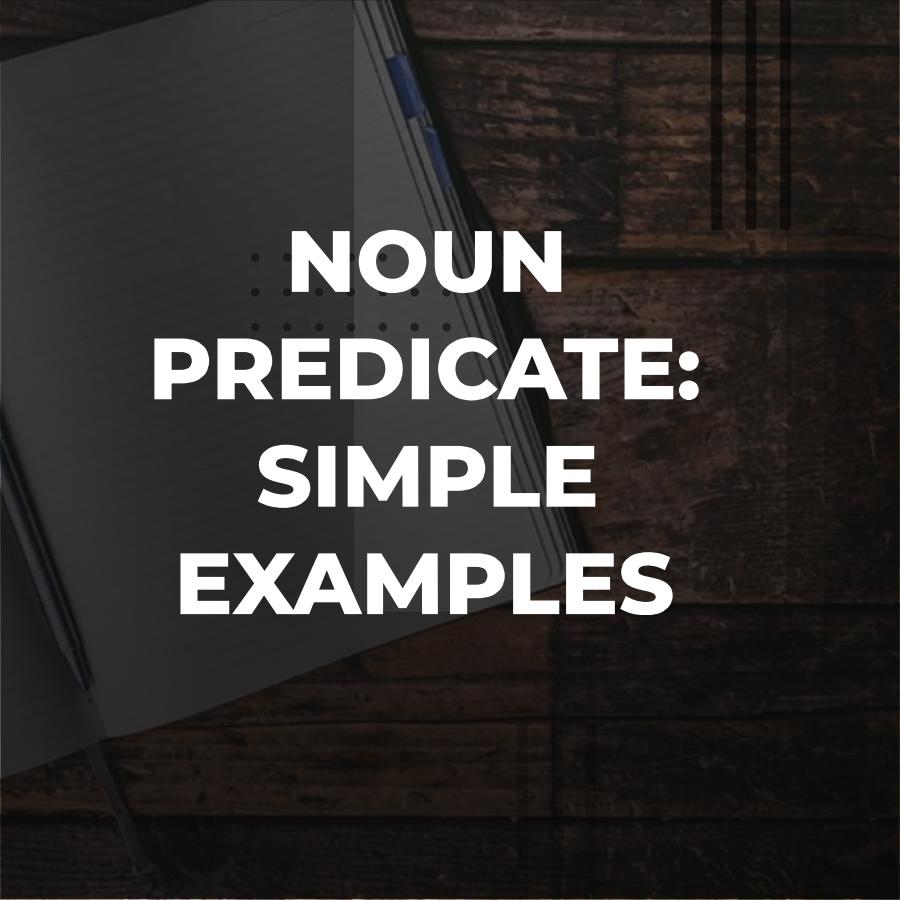Predicate nouns are essential components in sentence structure, providing clarity and meaning. However, many people struggle with their identification and use. So, what exactly is a predicate noun? Simply put, a predicate noun follows a linking verb and renames or describes the subject of the sentence. This article explores predicate nouns in detail, offering examples and real-life applications to ensure a solid understanding.
Table of Contents
What is a Predicate Noun?
A predicate noun (also known as a predicate nominative) is a noun that comes after a linking verb and refers back to the subject of the sentence. It “links” the subject of the sentence to further information about it. The most common linking verb is “to be,” but other linking verbs like “seem,” “become,” and “appear” can also be included.
Example Breakdown
Consider the following sentence:
- The dog is a loyal companion.
In this example, the subject is “the dog,” the linking verb is “is,” and “a loyal companion” functions as the predicate noun. Here, “a loyal companion” provides clarity about the subject, essentially restating or redefining it. In effect, it tells us what the dog is.
Common Linking Verbs
Many choose “to be” as a linking verb in sentences, yet different verbs also serve this role. Understanding these variations can help identify predicate nouns more effectively.
List of Linking Verbs
- Am
- Is
- Are
- Was
- Were
- Seem
- Become
- Feel
- Appear
Hypothetical Examples
Take this sentence:
- She seems happy.
In this case, “happy” is not a predicate noun but an adjective—showing how not every word following a linking verb serves as a predicate noun. Understanding the difference is key to mastering this concept.
Identifying Predicate Nouns
Learning to identify predicate nouns is about recognizing their roles in sentences. Predicate nouns always follow linking verbs and refer back to the subject.
More Examples
1. The winner is John.
- Here, “John” renames the subject “the winner.”
2. My favorite hobby is painting.
- “Painting” serves as the predicate noun, clarifying what the favorite hobby is.
3. They are friends.
- In this case, “friends” renames the subject “they.”
Practice Makes Perfect
Often, individuals find it easier to identify predicate nouns through practice. Here are a few sentences to analyze:
- There are many excellent books.
- This job is a challenge.
- The movie was a blockbuster.
In each case, identifying the linking verb allows you to find the predicate noun more easily.
Real-World Applications of Predicate Nouns
Understanding predicate nouns is crucial not only for grammar but also for effective communication. Predicate nouns enhance descriptions and provide clarity in writing.
Writing Fiction
For example, in fiction writing, judges of character or action are often framed by predicate nouns:
- The hero is a warrior.
Here, “warrior” shapes our understanding of the hero’s role, giving readers an immediate grasp of the character’s identity.
Professional Communication
In professional communication, predicate nouns can clarify roles or statuses in a workplace:
- Sarah is the manager of the marketing team.
This formation provides essential information about Sarah’s position and responsibilities.
Common Mistakes with Predicate Nouns
While predicate nouns are relatively straightforward, several common mistakes can trip individuals up.
Confusing Predicate Nouns with Adjectives
A prevalent pitfall is mistaking predicate nouns for adjectives. Remember:
- The weather is nice. (Adjective)
- The weather is a concern. (Predicate Noun)
The first sentence uses “nice” to describe the weather, while the second uses “a concern” to rename what the weather is.
Misplaced Linking Verbs
Using incorrect linking verbs can also lead to confusion.
- He seems teacher.
This sentence is incorrect because “teacher” functions as a predicate noun. The correct version would be “He seems to be a teacher.”
Expanding Vocabulary through Predicate Nouns
A fun way to enhance vocabulary and creative writing skills is to explore various predicate nouns. By doing so, writers can enrich their sentences and develop stronger narratives.
Exploring Unique Predicate Nouns
Here are some unusual predicate nouns to consider:
- She is a phenomenon.
- The day was an adventure.
- That place is a sanctuary.
Predicate nouns bring energy to writing and create scenes that stick in the mind, all without fancy phrases. Each example demonstrates how sentences can gain power by choosing clear, focused words.
Exercises to Strengthen Understanding
Incorporating exercises into your study routine can solidify your grasp of predicate nouns. Here are a few tasks to try:
Identify and Rewrite
1. Identify the predicate noun in each sentence.
- My brother is an astronaut.
- March is the best month.
2. Rewrite the sentence by changing the predicate noun.
- My cat is a superstar.
- Change “superstar” to “belly rubber.”
Create Your Sentences
Challenge yourself to create five sentences using predicate nouns:
- My car is a vintage model.
- The cake was a treat.
Classify Sentences
Classifying sentences by their linking verbs can also help:
- I am a writer. (am)
- She feels happy. (feels)
- Jones became the lead actor. (became)
By doing so, you can further dissect the structure and function of each word.
Predicate Nouns in Different Contexts
Each writing style and context calls for a unique way to handle predicate nouns. Here’s a look at various applications:
Poetry
In poetry, predicate nouns can create rhythm and a sense of flow without overly complex structures.
- Life is a journey.
The use of a predicate noun in this simple sentence brings about reflection.
Journalism
In journalism, clarity is vital.
- The suspect is a person of interest.
Knowing how to use predicate nouns accurately can help convey crucial information quickly and effectively.
Additional Information
Predicate nouns can add depth to sentences, yet many overlook their importance. Here are some facts you might not know:
- Linking Verbs: Predicate nouns follow linking verbs such as “is,” “are,” and “was,” establishing equality between the subject and the predicate noun. For example, in the sentence “She is a teacher,” “teacher” renames the subject “she.”
- Subject Complement: Predicate nouns function as subject complements, providing essential information about the subject. Without them, sentences can feel incomplete. For instance, “My brother seems nervous” includes “nervous” as the predicate noun, enhancing understanding of “my brother.”
- Different Forms: Predicate nouns can take various forms beyond simple nouns. They can also be noun phrases or compound nouns, like in “Her favorite pastimes are hiking and painting,” where both “hiking” and “painting” enhance the meaning of the subject.
- Common Confusion: Many mix up predicate nouns and direct objects. Predicate nouns rename or redefine the subject. Meanwhile, direct objects receive the action of the verb. In “She gave a book to him,” “book” is a direct object, not a predicate noun.
- Questioning Predicate Nouns: To identify a predicate noun, rephrase your sentence as a question. If it makes sense to ask, “What is the subject?” and the answer renames or describes it, then you’ve found your predicate noun.
- Negative Sentences: Predicate nouns can still function in negative sentences. For example, “That is not a solution” uses “solution” as a predicate noun, proving that negativity doesn’t negate the structure.
- Role in Compound Subjects: When dealing with compound subjects, each part can have its own predicate noun. In the sentence “My sister and her friend are mathematicians,” both “sister” and “friend” connect to the noun “mathematicians” through the verb “are.”
- Context Matters: The same word can serve as a predicate noun or not, depending on context. For instance, in “She grew up to be a doctor,” “doctor” is a predicate noun, but in “She gave a doctor a call,” it acts as a simple noun.
- Simplicity in Complexity: Predicate nouns may seem complex, but they often simplify understanding. They allow for concise explanations, ensuring that information is conveyed effectively without lengthy descriptions.
- Sentence Variation: Using predicate nouns can help vary sentence structures, making your writing more engaging. Instead of repeating subjects, you can say, “The winner was a champion,” instead of, “The winner was the one who won the championship.”
Frequently Asked Questions (FAQs) Related to Predicate Noun Examples
Q. What is a predicate noun?
A. A predicate noun is a noun that follows a linking verb and refers back to the subject, providing information about what the subject is.
Q. Can you give an example of a predicate noun?
A. Sure! In the sentence “She is a doctor,” the word “doctor” is the predicate noun, telling us what “she” is.
Q. Which linking verbs usually appear alongside predicate nouns?
A. Common linking verbs include “is,” “are,” “was,” “were,” “seem,” and “become.”
Q. How can I identify a predicate noun in a sentence?
A. Look for a noun that follows a linking verb and describes the subject. It’s usually after a form of “to be.”
Q. Are predicate nouns the same as object nouns?
A. No, predicate nouns are not the same as object nouns. Object nouns receive the action of the verb, while predicate nouns rename the subject.
Q. Can a sentence have more than one predicate noun?
A. Yes, a sentence can have more than one predicate noun, like in “The cat is a pet and a companion,” where “pet” and “companion” are both predicate nouns.
Q. Do all sentences with linking verbs have predicate nouns?
A. No, not all sentences with linking verbs contain predicate nouns. Some may use adjectives or other constructions instead.
Q. Can you change a predicate noun into a predicate adjective?
A. Yes, you can change it depending on what you want to convey. For example, in “The boy is tall,” “tall” is a predicate adjective, describing the subject instead of renaming it.
Q. How do I know if a word is functioning as a predicate noun?
A. If the word follows a linking verb and provides more information about the subject, it’s likely functioning as a predicate noun.
Q. Can predicate nouns be compound nouns?
A. Yes, predicate nouns can be compound nouns, like in “The winners are John and Sarah,” where “John and Sarah” collectively act as the predicate noun.
Conclusion
Understanding predicate nouns is essential for mastering sentence structure. They play a crucial role in connecting the subject of a sentence to additional information that describes or identifies it. By recognizing and using predicate nouns effectively, you can add clarity and depth to your writing. Whether discussing professions, roles, or qualities, predicate nouns help convey your message more precisely. Keep practicing, and soon you’ll find these grammatical gems becoming a natural part of your writing toolkit!







